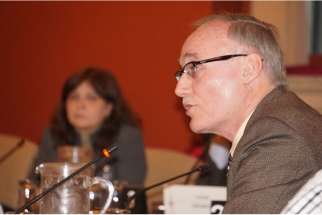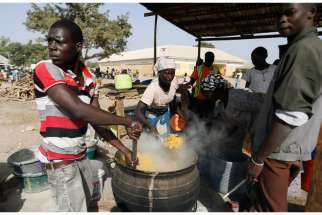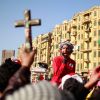OTTAWA - The Dignity for All campaign launched its national anti-poverty plan Feb. 3, urging politicians to make eliminating poverty a federal election issue.
Nigerian bishop calls for Western intervention to stop Boko Haram
ROME - Underlining the failure of the Nigerian government to stop the violent rampage of Boko Haram, a Catholic bishop has called for Western military intervention.
Religion’s role in Arab Spring is promoting dignity, official says
VATICAN CITY - Religious communities can assist the North African and Middle Eastern pro-democracy movements by upholding human dignity and not trying to claim power for one religion or one movement within a religion, a senior Vatican official said.
Comboni Father Miguel Angel Ayuso Guixot, secretary of the Pontifical Council for Interreligious Dialogue, represented the Vatican at a conference in Istanbul Sept. 7-8 on “The Arab Awakening and Peace in the New Middle East: Muslim and Christian Perspectives.” He told participants at the conference that democracy presumes respect for human rights, including the right to freedom of religion and worship.
“In the growing efforts to enable democracy to take hold in the fabric of society in the Arab world, the hope is that it will lead to greater consideration of these basic rights,” Ayuso said.
A hopeful sign, he said, was the publication in January of a “bill of rights of basic liberties” by Muslim scholars at Al-Azhar University in Cairo. The document encouraged recognition of the freedoms of worship, opinion, scientific research and art and creative expression in new constitutions throughout the Arab world.
The 2011 Arab Spring movements led to democratic elections in Morocco, Tunisia and Egypt where Islam-inspired political parties won the most votes. The risk with democracy, Ayuso said, is that it “potentially could be used to legitimate extremist and fundamentalist ideologies,” which would make life difficult not only for the Christian minorities, but also for moderate Muslims.
The role of religion, he said, is to nourish an atmosphere of respect for all men and women created by God and endowed with equal dignity, rights and responsibilities.
Ayuso also spoke about the ongoing violence in Syria in his interview with Vatican Radio and at the conference. The Vatican’s diplomatic efforts in that case are focused on achieving a ceasefire, promoting a negotiated settlement, preserving Syria’s multiethnic and multireligious character and getting the Syrian government to recognize the international community’s legitimate interest in the conflict as a potential source of instability to the entire region, he told Vatican Radio.
He told the conference that Syrian Christians want to live in peace and harmony with their fellow citizens, but they are “naturally fearful that the growing violence, destruction and displacement, the continuing loss of life, endangers not just Christians, but all Syrians, regardless of their ethnicity or religion.”
“The specter of what happened to Christians in Iraq” once Saddam Hussein’s regime fell increases Syrian Christians’ fears, he said.




